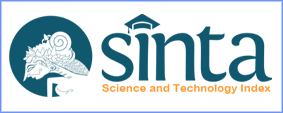Implementasi Moodle: Sebuah Solusi Pembelajaran Online di Masa Pandemi
Abstract
Keywords
Full Text:
PDFReferences
As’ari, A. R. (2014). Ideas for Developing Critical Thinking at Primary School Level. International Seminar on Addressing Higher Order Thinking: Critical Thinking Issues in Primary Education, (March), 1–13.
Baran, G. (2011). A Study on the Relationship between Six-Year-Old Children’ s Creativity and Mathematical Ability. International Education, 4(1), 105–112.
Bariyah, S. H., & Imania, K. A. N. (2018). Implementasi Blended Learning Berbasis Moodle Pada Jurusan Pendidikan Teknologi Informasi. Jurnal Petik, 4(2), 106–113.
Batubara, H. H. (2017). Pengembangan Media Pembelajaran Matematika berbasis Android untuk Siswa SD/MI. Muallimuna: Jurnal Madrasah Ibtidaiyah, 3(1), 12–27.
Betri, T. J. (2020). Pembelajaran Online Menghadapi Wabah Covid 19. Widya Wacana: Jurnal Ilmiah, 15(2), 140–147.
Ellis, A. B. (2007). Connections between generalizing and justifying: Students’ reasoning with linear relationships. Journal for Research in Mathematics Education, 38(3), 194–229.
Farooq, M., & Shah, S. (2008). Students’Attitude Towards Mathematics. Pakistan Economic and Social Review, 46(1), 75–83.
Fatmi, N., Muhammad, I., Muliana, M., & Nasrah, S. (2021). The Utilization of Moodle-Based Learning Management System (LMS) in Learning Mathematics and Physics to Students’ Cognitive Learning Outcomes. International Journal for Educational and Vocational Studies, 3(2), 155-162.
Fauzi, A., & Rahmatih, A. N. (2021). E-Learning Berbasis Moodle Sebagai Media Pembelajaran Matematika Ditinjau Dari Pemahaman Mahasiswa. JPMI :Jurnal Pembelajaran Matematika Inovatif, 4(6), 1543–1550.
Harahap, S. A., Dimyati, D., & Purwanta, E. (2021). Problematika Pembelajaran Daring dan Luring Anak Usia Dini bagi Guru dan Orang tua di Masa Pandemi Covid 19. Jurnal Obsesi : Jurnal Pendidikan Anak Usia Dini, 5(2), 1825–1836.
HE, C., Wulandari, A. N., Sutopo, S., & Kuswardi, Y. (2020). Application of Moodle as Authentic Assessment in Learning Mathematics in SMK. Journal of Mathematics and Mathematics Education, 10(2), 75-86.
Indrayana, B., & Sadikin, A. (2020). Penerapan E-Learning Di Era Revolusi Industri 4.0 Untuk Menekan Penyebaran Covid-19. Indonesian Journal of Sport Science and Coaching, 2(1), 46–55.
Kamaruddin, E. (2020). the Application of E-Learning Mathematics Using Moodle in Improving Students’ Problem Solving Ability. JISAE: Journal of Indonesian Student Assessment and Evaluation, 6(1), 1–10.
Kotzer, S., & Elran, Y. (2012). Learning and teaching with Moodle-based E-learning environments, combining learning skills and content in the fields of Math and Science & Technology. 1st Moodle Research Conference, 14–15.
Lopes, A., Babo, M., & Azevedo, J. (2003). Teaching Mathematics Using Moodle.
Maharani, S., Kholid, M. N., Pradana, L. N., & Nusantara, T. (2019). Problem Solving in the Context of Computational Thinking. Infinity Journal of Mathematics Education, 8(2), 109–116.
Maharani, S., Nusantara, T., Rahman, A., & Qohar, A. (2019). Analyticity and Systematicity Students of Mathematics Education on Solving Non-routine Problems. Mathematics and Statistics, 7(2), 50–55.
Marin, D.-C., & Bocoș, M. (2021). Characteristics of Online Learning in Higher Education During the COVID-19 Pandemic. Studia Universitatis Babeș-Bolyai Psychologia-Paedagogia, 66(1), 135–155.
Masfingatin, T., & Maharani, S. (2019). Computational Thinking : Students On Proving Geometry Theorem. International Journal of Scientific & Technology Research, 8(09), 2216–2223.
Medina, G., Lujano, Y., Aza, P., & Sucari, W. (2020). Revista Innova Educación. Revista Innova Educación, 2(4), 650–667.
Mlotshwa, N., Tunjera, N., & Chigona, A. (2020). Integration of moodle into the classroom for better conceptual understanding of functions in mathematics. South African Journal of Education, 40(3), 1–14.
Samala, A. D., Fajri, B. R., & Ranuharja, F. (2019). Desain dan implementasi media pembelajaran berbasis mobile learning menggunakan moodle mobile app. Jurnal Teknologi Informasi Dan Pendidikan, 12(2), 13–20.
Sampurno, P. J., Maulidiyah, R., & Puspitaningrum, H. Z. (2015). Implementasi Kurikulum 2013: MOODLE (Modular Object Oriented Dynamic Learning Environment) dalam Pembelajaran Fisika melalui Lembar Kerja Siswa pada Materi Optik di SMA (Halaman 54 s.d. 58). Jurnal Fisika Indonesia, 19(56), 54–58.
Setyawan, F. A., & Masduki, L. R. (2021). Desain math e-learning berbasis moodle pada sekolah penggerak. Conference.Upgris.Ac.Id, (2018), 346–353.
Sharma, R. S., & Jones, K. A. (2019). An experiment in blended learning: higher education without lectures. International Journal of Digital Enterprise Technology, 1(3), 241.
Sugiyono. (2009). Metode Penelitian Kuantitatif, Kualitatif, dan R&D. Bandung: Alfabeta.
Sugiyono. (2017). Metode Penelitian dan Pengembangan (Research and Development/ R&D). Bandung: Alfabeta.
Taban, J. G. (2021). Teaching Mathematics in a MOODLE-Based Learning Environment. Asia Pacific Journal of Multidisciplinary Research, 9(1), 19–29.
Umek, L., Aristovnik, A., Tomaževič, N., & Keržič, D. (2015). Analysis of Selected Aspects of Students’ Performance and Satisfaction in a Moodle-Based E-Learning System Environment. EURASIA Journal of Mathematics, Science & Technology Education, 11(6), 1495–1505.
Wicaksana, E. (2020). Efektifitas Pembelajaran Menggunakan Moodle Terhadap Motivasi Dan Minat Bakat Peserta Didik Di Tengah Pandemi Covid -19. EduTeach : Jurnal Edukasi Dan Teknologi Pembelajaran, 1(2), 117–124.
Wilkerson, M. H., & Fenwick, M. (2016). Using mathematics and computational thinking. Helping Students Make Sense of the World Using Next Generation Science and Engineering Practices, 181–204.
Yoshikawa, H., Wuermli, A. J., Britto, P. R., Dreyer, B., Leckman, J. F., Lye, S. J., … Stein, A. (2020). Effects of the Global Coronavirus Disease-2019 Pandemic on Early Childhood Development: Short- and Long-Term Risks and Mitigating Program and Policy Actions. Journal of Pediatrics, 223(May), 188–193.
Zaus, M. A., Wulansari, R. E., Islami, S., & Pernanda, D. (2018). Perancangan Media Pembelajaran Listrik Statis dan Dinamis Berbasis Android. INTECOMS: Journal of Information Technology and Computer Science, 1(1), 1–7.
Article Metrics
Abstract has been read : 327 timesPDF file viewed/downloaded: 0 times
DOI: http://doi.org/10.25273/jipm.v11i1.11080
Refbacks
- There are currently no refbacks.
Copyright (c) 2022 JIPM (Jurnal Ilmiah Pendidikan Matematika)

This work is licensed under a Creative Commons Attribution-ShareAlike 4.0 International License.
View JIPM Stats
JIPM indexed by:
Copyright of JIPM (Jurnal Ilmiah Pendidikan Matematika) ISSN 2502-1745 (Online) and ISSN 2301-7929 (Print)













